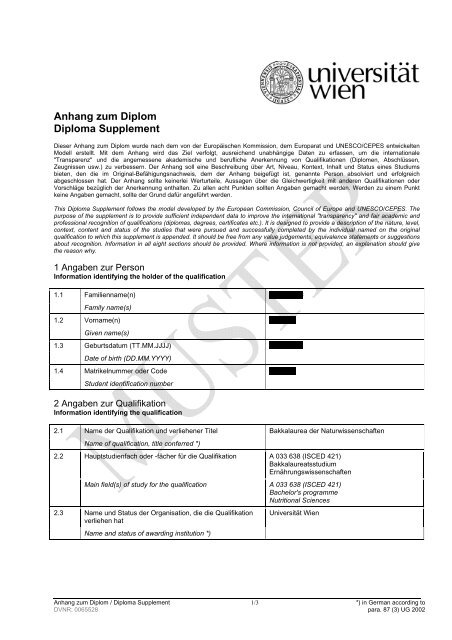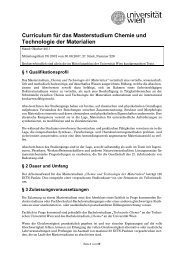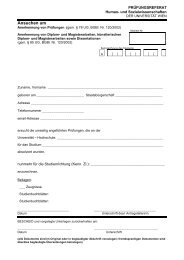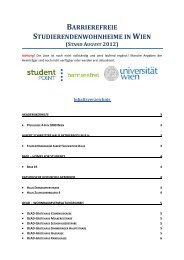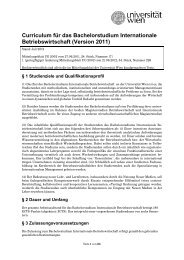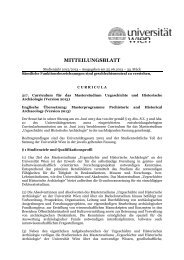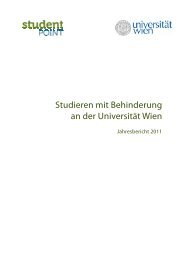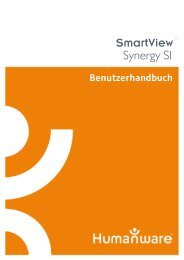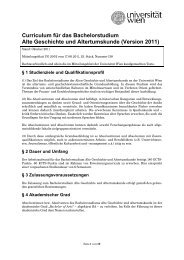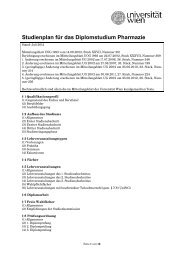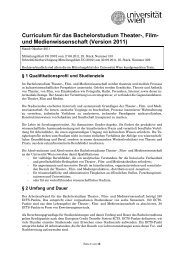Anhang zum Diplom Diploma Supplement - Student Point ...
Anhang zum Diplom Diploma Supplement - Student Point ...
Anhang zum Diplom Diploma Supplement - Student Point ...
Sie wollen auch ein ePaper? Erhöhen Sie die Reichweite Ihrer Titel.
YUMPU macht aus Druck-PDFs automatisch weboptimierte ePaper, die Google liebt.
<strong>Anhang</strong> <strong>zum</strong> <strong>Diplom</strong><br />
<strong>Diplom</strong>a <strong>Supplement</strong><br />
Dieser <strong>Anhang</strong> <strong>zum</strong> <strong>Diplom</strong> wurde nach dem von der Europäischen Kommission, dem Europarat und UNESCO/CEPES entwickelten<br />
Modell erstellt. Mit dem <strong>Anhang</strong> wird das Ziel verfolgt, ausreichend unabhängige Daten zu erfassen, um die internationale<br />
"Transparenz" und die angemessene akademische und berufliche Anerkennung von Qualifikationen (<strong>Diplom</strong>en, Abschlüssen,<br />
Zeugnissen usw.) zu verbessern. Der <strong>Anhang</strong> soll eine Beschreibung über Art, Niveau, Kontext, Inhalt und Status eines Studiums<br />
bieten, den die im Original-Befähigungsnachweis, dem der <strong>Anhang</strong> beigefügt ist, genannte Person absolviert und erfolgreich<br />
abgeschlossen hat. Der <strong>Anhang</strong> sollte keinerlei Werturteile, Aussagen über die Gleichwertigkeit mit anderen Qualifikationen oder<br />
Vorschläge bezüglich der Anerkennung enthalten. Zu allen acht Punkten sollten Angaben gemacht werden. Werden zu einem Punkt<br />
keine Angaben gemacht, sollte der Grund dafür angeführt werden.<br />
This <strong>Diplom</strong>a <strong>Supplement</strong> follows the model developed by the European Commission, Council of Europe and UNESCO/CEPES. The<br />
purpose of the supplement is to provide sufficient independent data to improve the international "transparency" and fair academic and<br />
professional recognition of qualifications (diplomas, degrees, certificates etc.). It is designed to provide a description of the nature, level,<br />
context, content and status of the studies that were pursued and successfully completed by the individual named on the original<br />
qualification to which this supplement is appended. It should be free from any value judgements, equivalence statements or suggestions<br />
about recognition. Information in all eight sections should be provided. Where information is not provided, an explanation should give<br />
the reason why.<br />
1 Angaben zur Person<br />
Information identifying the holder of the qualification<br />
1.1 Familienname(n) #########<br />
Family name(s)<br />
1.2 Vorname(n) #######<br />
Given name(s)<br />
1.3 Geburtsdatum (TT.MM.JJJJ) 11.11.1111<br />
Date of birth (DD.MM.YYYY)<br />
1.4 Matrikelnummer oder Code 0000000<br />
<strong>Student</strong> identification number<br />
2 Angaben zur Qualifikation<br />
Information identifying the qualification<br />
2.1 Name der Qualifikation und verliehener Titel Bakkalaurea der Naturwissenschaften<br />
Name of qualification, title conferred *)<br />
2.2 Hauptstudienfach oder -fächer für die Qualifikation A 033 638 (ISCED 421)<br />
Bakkalaureatsstudium<br />
Ernährungswissenschaften<br />
Main field(s) of study for the qualification A 033 638 (ISCED 421)<br />
Bachelor's programme<br />
Nutritional Sciences<br />
2.3 Name und Status der Organisation, die die Qualifikation<br />
verliehen hat<br />
Name and status of awarding institution *)<br />
Universität Wien<br />
<strong>Anhang</strong> <strong>zum</strong> <strong>Diplom</strong> / <strong>Diplom</strong>a <strong>Supplement</strong> 1/3 *) in German according to<br />
DVNR: 0065528 para. 87 (3) UG 2002
2.4 Name und Status der Einrichtung, die das Studium<br />
durchgeführt hat<br />
Name and status of institution administering studies *)<br />
Universität Wien<br />
2.5 Im Unterricht / in den Prüfungen verwendete Sprache(n) Deutsch<br />
Language(s) of instruction / examination German<br />
3 Angaben <strong>zum</strong> Niveau der Qualifikation<br />
Information on the level of the qualification<br />
3.1 Niveau der Qualifikation Bakkalaureatsstudium/Bachelorstudium (ISCED-<br />
Code 5A)<br />
Level of qualification Bachelor's degree programme (ISCED-Code 5A)<br />
3.2 Regelstudienzeit (gesetzliche Studiendauer) in Semestern 6 (180 ECTS)<br />
Official length of programme in semesters<br />
3.3 Zulassungsvoraussetzung(en) Reifeprüfung od. Äquivalent, siehe Punkt 8<br />
Access requirement(s) Secondary school leaving certificate or an<br />
equivalent (see section 8)<br />
4 Angaben über den Inhalt und die erzielten Ergebnisse<br />
Information on the contents and results gained<br />
4.1 Studienart Vollzeit<br />
Mode of study Full time<br />
4.2 Anforderungen des Studiums<br />
Das Bachelorstudium Ernährungswissenschaften vermittelt eine multidisziplinäre akademische Ausbildung auf<br />
dem Gebiet der Ernährungswissenschaften. Die Studierenden erwerben Kompetenzen zur wissenschaftlichen<br />
und praktischen Bearbeitung aller Problemstellungen, die sich aus der Beziehung der Nahrung <strong>zum</strong> Menschen<br />
und der Beziehung des Menschen zur Nahrung ergeben. Das Studium beginnt mit der Vermittlung von<br />
naturwissenschaftlichen Grundlagen, auf die eine umfassende wissenschaftliche Berufsvorbildung folgt.<br />
Insgesamt sind Pflichtmodule im Ausmaß von 166 ECTS und Wahlpflichtmodule im Ausmaß von 14 ECTS zu<br />
absolvieren. Für den erfolgreichen Abschluss des Studiums sind zwei Bachelorarbeiten anzufertigen.<br />
Programme requirements<br />
The bachelor's degree programme imparts a multidisciplinary academic education in the field of nutritional<br />
sciences. <strong>Student</strong>s acquire the ability to deal with any problem resulting from the impact of nutrition on the<br />
human and from the relation of the human to nutrition on a scientific and applied level. The programme starts<br />
with the principles of natural sciences and proceeds with extensive scientific pre-vocational training. <strong>Student</strong>s<br />
need to take required modules amounting to 166 ECTS and elective modules amounting to 14 ECTS.<br />
Successful completion of the programme also requires the preparation of two bachelor's papers.<br />
4.3 Angaben <strong>zum</strong> Studium (z.B. absolvierte Module und<br />
Einheiten) und erzielte Beurteilungen / Bewertungen /<br />
ECTS Anrechnungspunkte<br />
Programme details (courses, modules or units studied,<br />
individual grades obtained)<br />
Siehe beigefügte Fächer- und Notenübersicht<br />
See enclosed transcript of records<br />
4.4 Beurteilungsskala “sehr gut” – 1 – excellent<br />
“gut” – 2 – good<br />
“befriedigend” – 3 – satisfactory<br />
Grading scheme<br />
“genügend” – 4 – sufficient<br />
“nicht genügend” – 5 – unsatisfactory<br />
4.5 Gesamtbeurteilung der Qualifikation bestanden<br />
Overall classification of the qualification *)<br />
<strong>Anhang</strong> <strong>zum</strong> <strong>Diplom</strong> / <strong>Diplom</strong>a <strong>Supplement</strong> 2/3 *) in German according to<br />
DVNR: 0065528 para. 87 (3) UG 2002
5 Angaben zur Funktion der Qualifikation<br />
Information on the function of the qualification<br />
5.1 Zugangsberechtigung zu weiterführenden Studien Zugang zu Masterstudium<br />
Access to further study Access to master's degree programme<br />
5.2 Beruflicher Status<br />
Zugang zu akademischen Berufen nach<br />
Maßgabe der berufsrechtlichen Vorschriften;<br />
<strong>Diplom</strong> im Sinne der Richtlinie 89/48/EWG<br />
Professional status conferred Access to academic professions according to the<br />
professional regulations; diploma in the sense of<br />
directive RL 89/48/EEC<br />
6 Sonstige Angaben<br />
Additional information<br />
6.1 Weitere Angaben http://www.univie.ac.at<br />
Additional information<br />
6.2 Informationsquellen für ergänzende Angaben http://studieren.univie.ac.at<br />
Further information sources<br />
7 Beurkundung des <strong>Anhang</strong>es<br />
Certification of the supplement<br />
Wien, am 14. Januar 2010<br />
Vienna, this 14 January 2010<br />
Für die Studienpräses<br />
Univ.-Prof. Mag. Dr. Brigitte Kopp<br />
Ao. Univ.-Prof. Mag. Dr. Karl-Heinz Wagner<br />
Studienprogrammleitung Ernährungswissenschaften<br />
<strong>Anhang</strong> <strong>zum</strong> <strong>Diplom</strong> / <strong>Diplom</strong>a <strong>Supplement</strong> 3/3 *) in German according to<br />
DVNR: 0065528 para. 87 (3) UG 2002
Name<br />
Name<br />
Matrikel-Nr.<br />
Registration No.<br />
0000000<br />
####### #########<br />
Geburtsdatum<br />
Date of birth<br />
11.11.1111<br />
FÄCHER- UND NOTENÜBERSICHT<br />
TRANSCRIPT OF RECORDS<br />
Gem. Anerkennungsbescheid/-verordnung anerkannte Leistungen sind in dieser Übersicht erfassungsbedingt nur z.T. ausgewiesen.<br />
Due to limitations in data acquisition, recognised examinations from other fields of studies or other universities may not be included<br />
in this transcript.<br />
A 033 638 (ISCED 421)<br />
Bakkalaureatsstudium<br />
Ernährungswissenschaften<br />
A 033 638 (ISCED 421)<br />
Bachelor's programme<br />
Nutritional Sciences<br />
Prüfung<br />
Examination<br />
330044 UE<br />
330098 VO<br />
330046 VO<br />
330113 VO<br />
330011 VO<br />
330014 VO<br />
330039 VO<br />
330056 VO<br />
330079 UE<br />
330091 VO<br />
Chemische UE für<br />
Ernährungswissenschafter<br />
Chemical exercises (BAK M2 BACH M2<br />
DP1.1)<br />
Einführung in die Biostatistik<br />
Introduction in biostatistics (BAK M11<br />
BACH M10 DP1.9)<br />
Methoden der Ermittlung der<br />
Lebensmittelsicherheit<br />
Methods for the Determination of Food<br />
Safety (BAK M16 BACH M16)<br />
Methoden der Ernährungserhebungen<br />
Literaturrecherche und -auswertung<br />
Methodology of Nutrition Surveys Research<br />
and Interpretation of Literature (BAK M13<br />
BACH M13)<br />
Stoffwechselphysiologie der Pflanze<br />
Metabolism physiology of plants (BAK M3<br />
BACH M3 DP1.3)<br />
Grundlagen der Biochemie<br />
Basic Biochemistry (BAK M6 BACH M2)<br />
Gemeinschaftsverpflegung<br />
Communal feeding 1h(BAK M9 BACH M9)<br />
Ernährungslehre: Mikronährstoffe und<br />
sekundäre Pflanzeninhaltsstoffe<br />
Basics in Nutrition: Micronutrients and<br />
Secondary Plant Ingredients (BAK M13<br />
BACH M13)<br />
Übungen zur Mikrobiologie<br />
Microbiology Practicals (BAK M10 BACH<br />
M10 DP1.8)<br />
Ernährungslehre: angewandt und<br />
multidisziplinär<br />
Dietetics: Applied and Multidisciplinary<br />
(BAK M1BACH M1)<br />
SSt.<br />
Sem.hrs.<br />
8.00<br />
2.00<br />
2.00<br />
2.00<br />
2.00<br />
2.00<br />
1.00<br />
2.00<br />
3.00<br />
2.00<br />
<strong>Anhang</strong> <strong>zum</strong> <strong>Diplom</strong> / <strong>Diplom</strong>a <strong>Supplement</strong> 1/4<br />
DVNR: 0065528<br />
ECTS<br />
ECTS<br />
8.00<br />
3.00<br />
3.00<br />
3.00<br />
3.00<br />
3.00<br />
2.00<br />
3.00<br />
3.00<br />
3.00<br />
Datum<br />
Date<br />
Prüfer/Prüferin<br />
Examiner<br />
Note<br />
Grade<br />
01.02.200X Friedrich Vierhapper 2<br />
08.07.200X Andreas Baierl 1<br />
10.03.200X Karl-Heinz Wagner 3<br />
09.03.200X Karl-Heinz Wagner 2<br />
02.12.200X Marianne Popp 2<br />
03.07.200X Hans Goldenberg 2<br />
03.10.200X Georg Frisch 1<br />
06.02.200X Ibrahim Elmadfa 3<br />
04.04.200X Mohammad Manafi 1<br />
05.02.200X Ibrahim Elmadfa 4
330108 UE<br />
330047 VO<br />
330023 VO<br />
330013 VO<br />
330073 VO<br />
330082 VO<br />
330047 VO<br />
270310 VO<br />
330012 VO<br />
330034 UE<br />
330042 VO<br />
330011 VO<br />
330075 VO<br />
330019 VO<br />
330032 PR<br />
330081 VO<br />
330050 VO<br />
330038 VO<br />
300545 SE<br />
330069 SE<br />
330068 SE<br />
330088 VO<br />
Übungen zur Ernährung des Menschen II<br />
Nutritional Practice II (BAK M13 BACH M13<br />
DP2.1.1 LA 2.)<br />
Einführung in Vorratshaltung und<br />
Vorratsschutz<br />
Food Science II: Supply inventory and<br />
supply conservation (BAK M9 BACH M9)<br />
Allgemeine Lebensmitteltechnologie<br />
Chemical Food Technology and Physical<br />
Techniques of Food Processing (BAK M15)<br />
Botanik u. allg. Biologie f. Ernährungsw.<br />
Botany and General Biology (BAK M1<br />
BACH M3)<br />
Pflanzenproduktion<br />
Plant production (BAK M8 BACH M8 DP1.7<br />
LA1.)<br />
Produktion tierischer Lebensmittel (BAK<br />
M8, BACH M8, DP1.7, LA1.)<br />
Animal food Production (BAK M8, BACH<br />
M8, DP1.7, LA1.)<br />
Pathophysiologie<br />
Pathological Physiology (BAK M14 BACH<br />
M14 DP2.1.3)<br />
Lebensmittelanalytik II<br />
Analytical Chemistry (BAK M5 BACH M5<br />
DP2.1.4)<br />
Biotechnologie und Gentechnik in der<br />
Lebensmittelproduktion<br />
Biotechnology and Genetics Engineering in<br />
Food Production (BAK M8 BACH M8)<br />
Histologie und Zytologie<br />
Practice in Histology and Cytology (BAK-<br />
M2 BACH-M2)<br />
Ökologische Grundlagen der<br />
landwirtschaftlichen Produktion<br />
Ecological Fundamentals of Farm<br />
Production (BAK M8 DP1.7 LA 2.)<br />
Qualitätsbeurteilung und sensorische<br />
Analyse von Lebensmitteln<br />
Quality Assessment and Sensory Analysis<br />
of Food (BAK M10 BACH M10)<br />
Lebensmittelchemie<br />
Food chemistry (BAK M15)<br />
Physik für Ernährungswissenschafter<br />
Physics (BAK M4 BACH M4)<br />
Übungen zur Physik<br />
Physics Laboratory Course (BAK M4 BACH<br />
M4 DP1.2)<br />
Ernährungstherapie inklusive künstliche<br />
Ernährung<br />
Dietetic treatment including artificial<br />
nutrition (BAK M17 BACH M17 DP2.2.1)<br />
Lebensstil-/ernährungsassoziierte<br />
Erkrankungen/Diätetik<br />
Lifestyle and Nutricion Associated Diseases<br />
and Dietetics (BAK M17 BACH M17)<br />
Einführung in den biologischen Landbau<br />
Ecological Fundamentals of Farm<br />
Production (BAK M8 DP1.7 LA 2.)<br />
Effizientes Lernen<br />
BZO 12 Efficient Learning<br />
Wissenschaftliche Vertiefung und<br />
Bakkalaureatsarbeit I<br />
Scientific Expandation and Bachelor Work I<br />
(BAK M18)<br />
Wissenschaftliche Vertiefung und<br />
Bakkalaureatsarbeit II<br />
Scientific Expandation and Bachelor Work II<br />
(BAK M18)<br />
Physiologie des Menschen<br />
Human Physiology (BAK M1)<br />
5.00<br />
1.00<br />
2.00<br />
4.00<br />
2.00<br />
2.00<br />
2.00<br />
2.00<br />
2.00<br />
3.00<br />
2.00<br />
2.00<br />
3.00<br />
2.00<br />
2.00<br />
2.00<br />
2.00<br />
2.00<br />
1.00<br />
7.00<br />
7.00<br />
4.00<br />
<strong>Anhang</strong> <strong>zum</strong> <strong>Diplom</strong> / <strong>Diplom</strong>a <strong>Supplement</strong> 2/4<br />
DVNR: 0065528<br />
5.00<br />
3.00<br />
3.00<br />
6.00<br />
3.00<br />
3.00<br />
3.00<br />
3.00<br />
3.00<br />
3.00<br />
3.00<br />
3.00<br />
4.50<br />
3.00<br />
2.00<br />
3.00<br />
3.00<br />
3.00<br />
1.00<br />
7.00<br />
7.00<br />
6.00<br />
25.06.200X Doris Freistetter 2<br />
13.05.200X Dorota Majchrzak 3<br />
07.01.200X Emmerich Berghofer 1<br />
02.02.200X Susanne Till 3<br />
07.05.200X Ralph Gretzmacher 2<br />
11.03.200X Rudolf Leitgeb 2<br />
05.10.200X Jürg Graf 3<br />
09.12.200X Erich Schmid 1<br />
10.02.200X Alexander Haslberger 3<br />
03.02.200X Gerhard Viehberger 2<br />
11.01.200X Ludwig Maurer 2<br />
06.02.200X Dorota Majchrzak 3<br />
11.03.2009 Robert Ebermann 2<br />
11.06.200X Bernhard Wielke 4<br />
08.07.200X Viktor Schlosser 3<br />
13.10.200X Dieter Genser 1<br />
04.01.200X Petra Rust 3<br />
20.06.200X Ludwig Maurer 1<br />
15.07.200X<br />
Adrienne Hilgers-<br />
Szántó<br />
07.10.200X Jürg Graf 2<br />
09.10.200X Jürg Graf 1<br />
23.10.200X Cem Ekmekcioglu 1<br />
1
330082 VO<br />
330086 VO<br />
330050 UE<br />
330107 UE<br />
330099 UE<br />
330022 VO<br />
330050 VO<br />
330043 VO<br />
330083 VO<br />
330103 UE<br />
330001 VO<br />
330025 UE<br />
330024 VO<br />
330036 UE<br />
330021 VO<br />
330104 VO<br />
330013 VO<br />
300098 VO<br />
330074 SE<br />
300711 VO<br />
Spezielle Biochemie einschließlich<br />
Pathobiochemie<br />
Biochemical Metabolic Balance including<br />
Pathophysiology (BAK M14 BACH M14<br />
DP2.1.3)<br />
Naturstoffchemie<br />
Chemistry of natural materials (BAK M5<br />
BACH M5 DP1.1)<br />
Lebensmittelanalytisches Praktikum<br />
Laboratory course in food chemistry (BAK<br />
M15 BACH M15 DP2.1.4)<br />
Übungen zur Ernährung des Menschen I<br />
einschließlich Ernährungsanthropometrie<br />
Nutritional Practice I including Nutricion<br />
Anthropometry (BAK M7 BACH M7)<br />
UE zur EDV und Biometrie<br />
I.T. and Biometry Practicals (BAK M11<br />
BACH M11 DP1.9)<br />
Einführung in das Lebensmittelrecht<br />
Introduction to Food Law (BAK M16 BACH<br />
M16 DP2.1.5 LA2.)<br />
Anatomie und Histologie<br />
Human Anatomy and Histology (BAK M1)<br />
Einführung in die Mikrobiologie und<br />
Hygiene<br />
Introduction to Microbiology and Hygene<br />
(BAK M10 BACH M10)<br />
Biochemische Arbeitstechniken<br />
Biochemical technique (BAK M6 BACH M6)<br />
Übungen zu Vorratshaltung und -schutz<br />
Food Storage and Preservation Practicals<br />
(BAK M9 BACH M9)<br />
Allgemeine und organische Chemie<br />
General and Organic Chemistry (BAK M2<br />
BACH M1 DP1.1LA1.)<br />
Biochemisches Praktikum (Parallelkurs)<br />
Biochemical Practise 6h (BAK M6 BACH<br />
M6 DP1.5)<br />
Lebensmitteltoxikologie<br />
Food Toxicology (BAK M10 BACH M10<br />
DP2.1.5)<br />
Übungen Lebensstil-<br />
/ernährungsassoziierte<br />
Erkrankungen/Diätetik<br />
Practices in Lifestyle and Nutrition<br />
Associated Diseases and Dietetics (BAK<br />
M17 BACH 17)<br />
Humanökologie<br />
Human ecology 2h(BAK M3 BACH M3<br />
DP1.4)<br />
Typ der wiss. Arbeit<br />
Type of thesis<br />
Nicht zutreffend<br />
Not applicable<br />
Ernährungslehre: Energiestoffwechsel<br />
Makronährstoffe<br />
Basics in Nutrition: Energy Metabolism<br />
Macronutrients (BAK M7 BACH M7)<br />
Sport u.Ernährung<br />
Sport and Nutrition (BAK M17 BACH M17)<br />
Anatomie und Biologie der Tiere<br />
BBA 1 Animal Anatomy and Biology<br />
Seminar zur Speziellen Ernährungslehre<br />
Seminar on Nutritional Sciences (BAK M13<br />
BACH M13 DP2.1.1 LA 2.)<br />
Writing and Speaking Scientific English<br />
WZB Lecture (3 ECTS 2 SWS)<br />
Titel<br />
Titel<br />
2.00<br />
2.00<br />
4.00<br />
4.00<br />
2.00<br />
2.00<br />
3.00<br />
2.00<br />
2.00<br />
2.00<br />
4.00<br />
6.00<br />
2.00<br />
2.00<br />
2.00<br />
2.00<br />
2.00<br />
3.00<br />
2.00<br />
2.00<br />
<strong>Anhang</strong> <strong>zum</strong> <strong>Diplom</strong> / <strong>Diplom</strong>a <strong>Supplement</strong> 3/4<br />
DVNR: 0065528<br />
3.00<br />
3.00<br />
4.00<br />
4.00<br />
2.00<br />
3.00<br />
4.50<br />
3.00<br />
3.00<br />
2.00<br />
6.00<br />
6.00<br />
3.00<br />
2.00<br />
3.00<br />
3.00<br />
3.00<br />
4.00<br />
2.00<br />
3.00<br />
09.07.200X Hans Goldenberg 2<br />
11.12.200X Wolfgang Reischl 2<br />
12.05.200X Margit Cichna-Markl 2<br />
14.12.200X Petra Klein 2<br />
20.06.200X Thomas Ledl 3<br />
25.01.200X Wilfried-Klaus<br />
Smolka<br />
21.05.200X Alfred Windisch 1<br />
16.11.200X Mohammad Manafi 2<br />
11.04.200X Manfred Hüttinger 4<br />
27.06.200X Dorota Majchrzak 2<br />
19.09.200X Eberhard Lorbeer 2<br />
25.05.200X Manfred Hüttinger 2<br />
02.02.200X Rosa Lemmens 3<br />
22.11.200X Verena Nowak 2<br />
27.01.200X Bernd Lötsch 4<br />
28.06.200X Karl-Heinz Wagner 4<br />
18.05.200X Paul Haber 3<br />
29.06.200X Helge Hilgers 3<br />
30.06.200X Ibrahim Elmadfa 1<br />
30.06.200X Timothy Skern 2<br />
Approbationsdatum<br />
Date of approval<br />
1<br />
Note<br />
Grade
Noten: sehr gut (1), gut (2), befriedigend (3), genügend (4), nicht genügend (5), mit Erfolg teilgenommen (+), ohne Erfolg<br />
teilgenommen (-)<br />
Grades: excellent (1), good (2), satisfactory (3), sufficient (4), unsatisfactory (5), successfully completed (+), failed to<br />
complete (-)<br />
Gesamtbeurteilung: mit Auszeichnung bestanden (Z), bestanden (B), nicht bestanden (U)<br />
Overall assessment: mit Auszeichnung bestanden (Z), bestanden (B), nicht bestanden (U)<br />
<strong>Anhang</strong> <strong>zum</strong> <strong>Diplom</strong> / <strong>Diplom</strong>a <strong>Supplement</strong> 4/4<br />
DVNR: 0065528
8 Informationen <strong>zum</strong> österreichischen<br />
Hochschulsystem<br />
Stand: 10. Juli 2008<br />
Der postsekundäre Sektor in Österreich<br />
• In Österreich umfasst der postsekundäre Sektor auf<br />
Universitätsniveau („Hochschulsektor“)<br />
- die Universitäten, erhalten vom Staat;<br />
- die Erhalter von Fachhochschul-Studiengängen, erhalten<br />
von privatrechtlich organisierten und staatlich<br />
subventionierten oder von öffentlichen Trägern, mit<br />
staatlicher Akkreditierung (manchen Trägern wurde die<br />
Berechtigung zur Führung der Bezeichnung<br />
„Fachhochschule“ verliehen);<br />
- die Privatuniversitäten, erhalten von privaten Trägern mit<br />
staatlicher Akkreditierung;<br />
- die Pädagogischen Hochschulen, erhalten vom Staat oder<br />
von privaten Trägern mit staatlicher Akkreditierung;<br />
- die Philosophisch-Theologischen Hochschulen, erhalten<br />
von der Katholischen Kirche.<br />
• Der außeruniversitäre postsekundäre Sektor umfasst<br />
- die Hebammenakademien;<br />
- die Medizinisch-Technischen Akademien;<br />
- die Militärischen Akademien;<br />
- die <strong>Diplom</strong>atische Akademie;<br />
- bestimmte Psychotherapeutische Ausbildungseinrichtungen;<br />
- die Konservatorien;<br />
- bestimmte Wirtschaftsschulen.<br />
Im Folgenden wird ausschließlich auf den „Hochschulsektor“<br />
eingegangen.<br />
Allgemeine Struktur des Hochschulwesens<br />
Es gibt ein altes und ein neues System der österreichischen<br />
ordentlichen Studien: das alte ohne Bezug <strong>zum</strong> Bologna-Prozess<br />
und das neue mit Bezug dazu.<br />
• Das alte System ist das der <strong>Diplom</strong>studien, die<br />
grundsätzlich auf der Basis einer Reifeprüfung begonnen<br />
werden und deren Abschluss zur Aufnahme eines<br />
Doktoratsstudiums berechtigt. Ein <strong>Diplom</strong>grad wird von den<br />
Universitäten nach einem <strong>Diplom</strong>studium mit 240 bis 360<br />
ECTS credits verliehen. Der volle Wortlaut ist<br />
„Magister/Magistra ...“ samt einer fachspezifischen<br />
Beifügung, z.B. „Magister philosophiae“. In den<br />
ingenieurwissenschaftlichen Studien ist der Wortlaut<br />
„<strong>Diplom</strong>-Ingenieur/in“. Das Studium der Humanmedizin und<br />
der Zahnmedizin sind Ausnahmen: Hier wird als erster<br />
akademischer Grad „Doctor medicinae universae“ bzw.<br />
„Doctor medicinae dentalis" nach einem <strong>Diplom</strong>studium mit<br />
360 ECTS credits verliehen.<br />
In Fachhochschul-Studiengängen wird, analog zu den<br />
Universitätsstudien, ein Fachhochschul-<strong>Diplom</strong>grad<br />
(„<strong>Diplom</strong>-Ingenieur/in (FH)“ im ingenieurwissenschaftlichen<br />
<strong>Anhang</strong> <strong>zum</strong> <strong>Diplom</strong> / <strong>Diplom</strong>a <strong>Supplement</strong> 1/5<br />
DVNR: 0065528<br />
8 Information on the Austrian higher<br />
education system<br />
As of 10th July 2008<br />
Post-secondary Education in Austria<br />
• The Austrian post-secondary university level sector<br />
(Hochschulsektor) consists of<br />
- universities (Universitäten), maintained by the state;<br />
- maintainers of university of applied sciences degree<br />
programmes (Fachhochschul-Studiengänge) incorporated<br />
upon the basis of private or public law and subsidised by the<br />
state, with state accreditation (some of which are entitled to<br />
use the designation Fachhochschule);<br />
- private universities (Privatuniversitäten), operated by<br />
private organisations with state accreditation;<br />
- university colleges of education (Pädagogische<br />
Hochschulen) maintained by the state or operated by private<br />
organisations with state accreditation;<br />
- universities of philosophy and theology (Philosophisch-<br />
Theologische Hochschulen), operated by the Roman<br />
Catholic Church.<br />
• The non-university post-secondary sector<br />
(außeruniversitärer postsekundärer Sektor) consists of<br />
- academies for midwifery (Hebammenakademien);<br />
- clinical technical academies (Medizinisch-Technische<br />
Akademien);<br />
- military academies (Militärische Akademien);<br />
- the school of international studies (<strong>Diplom</strong>atische<br />
Akademie);<br />
- certain training institutions for psychotherapists<br />
(Psychotherapeutische Ausbildungseinrichtungen);<br />
- conservatories (Konservatorien);<br />
- certain business schools (Wirtschaftsschulen).<br />
The following text addresses exclusively the university level<br />
sector.<br />
Overall Structure of University Level Higher Education<br />
There are currently two different systems of degree programmes<br />
in Austria: an older system without reference to the Bologna<br />
process and a newer one with reference to it.<br />
• Under the auspices of the older system of diploma degree<br />
programmes (<strong>Diplom</strong>studien), the first degree awarded is<br />
the diploma degree (<strong>Diplom</strong>grad). An Austrian higher<br />
secondary school leaving certificate or its equivalent is the<br />
general qualification necessary for enrolling in a diploma<br />
degree programme; conclusion of a diploma degree<br />
programme entitles degree holders to enrol in doctoral<br />
degree programmes. A diploma degree (<strong>Diplom</strong>grad) is<br />
awarded by Austrian universities after a course of study<br />
consisting of 240 to 360 ECTS credits. Full degree titles are<br />
gender specific designations: Magister for men; Magistra for<br />
women. Degree titles also include a general description of<br />
the field of study in which they were obtained, e.g. Magister<br />
philosophiae. In the fields of engineering, the degree titles
Bereich bzw. „Magister/Magistra (FH)“ in den anderen<br />
Bereichen; 240 bis 300 ECTS credits) verliehen.<br />
• Das neue System folgt der Trennung zwischen einem<br />
Undergraduate-Studium und einem Graduate-Studium.<br />
Nach Beendigung des Undergraduate-Studiums<br />
(Bachelorstudium an Universitäten; Fachhochschul-<br />
Bachelorstudiengang; Studiengang an Pädagogischen<br />
Hochschulen; 180 ECTS credits) wird ein Bachelorgrad (mit<br />
dem Wortlaut „Bachelor of/in ...“) verliehen. Nach<br />
Beendigung des Graduate-Studiums (Masterstudium an<br />
Universitäten mit 120 ECTS credits bzw. Fachhochschul-<br />
Masterstudiengang mit 60 bis 120 ECTS credits) wird ein<br />
Mastergrad (mit dem Wortlaut „Master of/in ...“) verliehen. In<br />
ingenieurwissenschaftlichen Graduate-Studien kann der<br />
Mastergrad auch „<strong>Diplom</strong>-Ingenieur/in“ lauten.<br />
Die Inhaber/innen dieser <strong>Diplom</strong>grade oder Mastergrade<br />
(einschließlich Fachhochschul-<strong>Diplom</strong>graden oder<br />
Fachhochschul-Mastergraden) sind zur Zulassung <strong>zum</strong><br />
Doktoratsstudium an einer Universität berechtigt. Der Doktorgrad<br />
(mit dem Wortlaut „Doktor/in ...“) wird nach einem Studium mit<br />
120 ECTS credits, der akademi-sche Grad „Doctor of Philosophy“<br />
(„PhD“) nach einem forschungsorientierten Studium mit 180 bis<br />
240 ECTS credits verliehen.<br />
Neben den ordentlichen Studien, die oben beschrieben wurden,<br />
gibt es auch außerordentliche Studien, die an Universitäten<br />
entweder ein Universitätslehrgang oder der Besuch einzelner<br />
Lehrveranstaltungen, im Fachhochschulbereich ein Lehrgang zur<br />
Weiterbildung und an Pädagogischen Hochschulen ein<br />
Hochschullehrgang sein können.<br />
<strong>Diplom</strong>studium<br />
Die Zulassung zu einem <strong>Diplom</strong>studium erfolgt auf der Grundlage<br />
eines österreichischen oder gleichwertigen ausländischen<br />
Reifezeugnisses, eines Zeugnisses über die<br />
Studienberechtigungsprüfung oder eines Zeugnisses über die<br />
Berufsreifeprüfung, in künstlerischen Studien auf der Grundlage<br />
einer Zulassungsprüfung. Die Zulassung zu einem<br />
Fachhochschul-<strong>Diplom</strong>studiengang kann auch auf der Grundlage<br />
einer einschlägigen beruflichen Qualifikation erfolgen. In einigen<br />
Studien (vor allem Humanmedizin und Zahnmedizin sowie in<br />
Fachhochschul-<strong>Diplom</strong>studiengängen)<br />
Auswahlverfahren statt.<br />
findet ein<br />
Das Studium kann in Studienabschnitte unterteilt sein. Die Dauer<br />
jedes Studienabschnitts, die Fächer und ihre Inhalte sind im<br />
Curriculum festgelegt. Sie gliedern sich in Pflichtfächer und<br />
Wahlfächer. Jeder Studienabschnitt wird mit einer <strong>Diplom</strong>prüfung<br />
abgeschlossen. Fachhochschul-<strong>Diplom</strong>studiengänge und einige<br />
<strong>Diplom</strong>studien an Universitäten umfassen ein angeleitetes<br />
Praktikum. Die Zulassung zur letzten <strong>Diplom</strong>prüfung setzt die<br />
Approbation der <strong>Diplom</strong>arbeit voraus.<br />
Bachelorstudium<br />
Die Zulassung zu einem Bachelorstudium erfolgt auf der<br />
Grundlage eines österreichischen oder gleichwertigen<br />
ausländischen Reifezeugnisses, eines Zeugnisses über die<br />
Studienberechtigungsprüfung oder eines Zeugnisses über die<br />
Berufsreifeprüfung, in künstlerischen Studien auf der Grundlage<br />
einer Zulassungsprüfung.<br />
Die Zulassung zu einem Fachhochschul-Bachelorstudiengang<br />
kann auch auf der Grundlage einer einschlägigen beruflichen<br />
Qualifikation erfolgen. In einigen Studien (vor allem in<br />
Fachhochschul-Bachelorstudiengänge und in Studiengängen an<br />
Pädagogischen Hochschulen) findet ein Auswahlverfahren statt.<br />
Die Fächer/Module und ihre Inhalte sind im Curriculum festgelegt.<br />
<strong>Anhang</strong> <strong>zum</strong> <strong>Diplom</strong> / <strong>Diplom</strong>a <strong>Supplement</strong> 2/5<br />
DVNR: 0065528<br />
are <strong>Diplom</strong>-Ingenieur/in. Degrees awarded in medicine and<br />
dentistry are exceptions to the above. The first degrees<br />
awarded after the completion of these degree programmes<br />
consisting of 360 ECTS credits are Doctor medicinae<br />
universae and Doctor medicinae dentalis, respectively.<br />
Graduates of university of applied sciences programmes<br />
that consist of 240 to 300 ECTS credits are awarded,<br />
analogous to university studies, a university of applied<br />
science diploma degree (Fachhochschul-<strong>Diplom</strong>grad)<br />
contingent upon discipline: either a <strong>Diplom</strong>-Ingenieur/in (FH)<br />
for fields of engineering or Magister/Magistra (FH) in other<br />
fields of study.<br />
• The new system is based on the distinction between<br />
undergraduate and graduate studies. Upon completion of an<br />
undergraduate programme (Bachelorstudium at universities;<br />
Fachhochschul-Bachelorstudiengang; Studiengang at<br />
university colleges of education; 180 ECTS credits), a<br />
bachelor’s degree (designation: „Bachelor of/in ...“ ) is<br />
awarded. Upon completion of a graduate programme (Masterstudium<br />
at universities comprising 120 ECTS credits or,<br />
respectively, Fachhochschul-Masterstudiengang comprising<br />
60 to 120 ECTS credits), a master’s degree (designation:<br />
„Master of/in ...“ ) is awarded. In the fields of engineering,<br />
the designation of the master’s degree can also be „<strong>Diplom</strong>-<br />
Ingenieur/in“.<br />
Recipients of these diploma degrees from the old system or<br />
master’s degrees from the new system (including the ones<br />
awarded in both cases by the universities of applied sciences) are<br />
entitled to enrol in doctoral degree programmes<br />
(Doktoratsstudium) at universities. A doctoral degree (Doktorgrad<br />
with the designation Doktor/in“) is awarded after a course of study<br />
consisting of 120 ECTS credits; the academic title of “Doctor of<br />
Philosophy”, abbreviated as “PhD,” is awarded after a research<br />
intensive course of study consisting of 180 to 240 ECTS credits.<br />
In addition to the degree programmes (ordentliche Studien)<br />
described above, there are non-degree programmes<br />
(außerordentliche Studien) consisting of certificate university<br />
programmes for further education (Universitätslehrgänge) and<br />
individual courses in scientific subjects, both at universities,<br />
certificate university of applied sciences programmes for further<br />
education (Lehrgänge zur Weiterbildung) at universities of applied<br />
sciences, and certificate university college programmes for further<br />
education (Hochschullehrgänge) at university colleges of<br />
education.<br />
<strong>Diplom</strong>a Degree Programme (<strong>Diplom</strong>studium)<br />
Admission to a diploma degree programme is granted upon the<br />
basis of the Austrian higher secondary school leaving certificate<br />
(Reifezeugnis), its foreign equivalent, or the successful<br />
completion of a special university entrance qualification<br />
examination (Studienberechtigungsprüfung). <strong>Student</strong>s of<br />
compulsory lower schools who have completed additional<br />
schooling in the form of apprenticeships as skilled workers also<br />
may take a vocationally based examination acknowledged as<br />
equivalent to the higher secondary school leaving certificate<br />
(Berufsreifeprüfung). Admission to diploma degree programmes<br />
in the arts is based on aptitude ascertained by admission<br />
examinations. Admission to university of applied sciences<br />
diploma degree programmes may also take place upon the basis<br />
of previous vocational or technical experience and qualifica-tions<br />
of applicants. In some fields of study (in particular human<br />
medicine and dentistry, and university of applied sciences<br />
diploma degree programmes) admission is based on a selective<br />
admission process.´<br />
A degree programme may be divided into stages<br />
(Studienabschnitte). The length of each stage of the degree<br />
programme as well as the areas of study (Fächer) and content<br />
required are articulated in curricula that distinguish between<br />
required subjects (Pflichtfächer) and electives (Wahlfächer). Each<br />
stage concludes with a diploma examination (<strong>Diplom</strong>prüfung).
In der Regel sind zwei Bachelorarbeiten im Rahmen von<br />
Lehrveranstaltungen abzufassen. Fachhochschul-<br />
Bachelorstudiengänge und einige Bachelorstudien an<br />
Universitäten umfassen ein angeleitetes Praktikum. Das Studium<br />
kann mit einer Bachelorprüfung abgeschlossen werden.<br />
Masterstudium<br />
Die Zulassung zu einem Masterstudium erfolgt auf der Grundlage<br />
eines abgeschlossenen österreichischen Bachelorstudiums oder<br />
eines gleichwertigen postsekundären Abschlusses.<br />
Die Fächer/Module und ihre Inhalte sind im Curriculum festgelegt.<br />
Ein Schwerpunkt des Studiums liegt auf der Erstellung der<br />
Masterarbeit. Das Studium wird mit einer Masterprüfung<br />
abgeschlossen. Die Zulassung zur Masterprüfung setzt die<br />
Approbation der Masterarbeit voraus. An Pädagogischen<br />
Hochschulen gibt es kein Masterstudium.<br />
Doktoratsstudium<br />
Die Zulassung zu einem Doktoratsstudium an einer Universität<br />
erfolgt auf der Grundlage eines abgeschlossenen<br />
österreichischen <strong>Diplom</strong>- oder Masterstudiums oder eines<br />
gleichwertigen postsekundären Abschlusses.<br />
Die Inhalte und Anforderungen sind im Curriculum festgelegt. Das<br />
Hauptgewicht liegt auf der Anfertigung einer Dissertation als<br />
Ergebnis einer selbstständigen wissenschaftlichen<br />
Forschungsleistung. Das Studium wird mit der Approbation der<br />
Dissertation und einem Rigorosum/einer Defensio<br />
abgeschlossen.<br />
Im Fachhochschulbereich und an Pädagogischen Hochschulen<br />
gibt es kein Doktoratsstudium.<br />
Leistungsbewertung und Notensystem<br />
Entsprechend den in den Studienplänen geregelten Prüfungsmodalitäten<br />
kann die Bewertung der Leistungen in der Form<br />
<strong>Anhang</strong> <strong>zum</strong> <strong>Diplom</strong> / <strong>Diplom</strong>a <strong>Supplement</strong> 3/5<br />
DVNR: 0065528<br />
University of applied sciences diploma degree programmes and<br />
some diploma degree programmes at universities include an<br />
internship or practical training. The approval of a diploma thesis<br />
(<strong>Diplom</strong>arbeit) is a prerequisite for admission to the concluding<br />
diploma examination.<br />
Bachelor Degree Programme (Bachelorstudium)<br />
Admission to a bachelor degree programme is granted upon the<br />
basis on the Austrian higher secondary school leaving certificate<br />
(Reifezeugnis), its foreign equivalent, or the successful<br />
completion of a special university entrance qualification<br />
examination (Studienberechtigungsprüfung). <strong>Student</strong>s of<br />
compulsory lower schools who have completed additional<br />
schooling in the form of apprenticeships as skilled workers may<br />
take a vocationally based examination acknowledged as<br />
equivalent to the higher secondary school leaving certificate<br />
(Berufsreifeprüfung). Admission to bachelor degree programmes<br />
in the arts is based on aptitude ascertained by admission<br />
examinations. Admission to university of applied sciences<br />
bachelor degree programmes may also take place upon the basis<br />
of previous vocational or technical experience and qualifications<br />
of applicants. In some fields of study (in particular university of<br />
applied sciences bachelor degree programmes and study<br />
programmes at university colleges of education) admission is<br />
based on a selective admission process.<br />
Areas/Modules of study (Fächer/Module) are laid down in<br />
curricula. As a rule, two substantial bachelor’s papers or projects<br />
(Bachelorarbeiten) must be completed in the process of<br />
completing degree programme requirements. University of<br />
applied sciences bachelor degree programmes and some<br />
bachelor degree programmes at universities include an internship<br />
or practical training. The programme can conclude with a<br />
bachelor’s examination (Bachelorprüfung).<br />
Master Degree Programme (Masterstudium)<br />
Admission to a master degree programme is granted on the basis<br />
of the successful completion of an Austrian bachelor degree<br />
programme (Bachelorstudium), or a comparable post-secondary<br />
degree acknowledged being its equivalent.<br />
Areas/Modules of study (Fächer/Module) are laid down in<br />
curricula. A main emphasis is the composition of a master’s thesis<br />
(Masterarbeit). This degree programme concludes with a master’s<br />
examination (Masterprüfung). The approval of the master’s thesis<br />
(Masterarbeit) is a prerequisite for admission to this examination.<br />
At university colleges of education no master degree programmes<br />
are offered.<br />
Doctoral Degree Programme (Doktoratsstudium)<br />
Admission to a doctoral degree programme at a university is<br />
granted on the basis of the successful completion of an Austrian<br />
diploma or master degree programme, or a comparable postsecondary<br />
degree acknowledged being their equivalents.<br />
Contents and requirements of study are laid down in curricula.<br />
The focus lies with the drafting of a dissertation as the result of<br />
self-guided research performance. This degree programme<br />
concludes with the approval of the dissertation and with a<br />
comprehensive doctoral examination (Rigorosum) or a defensio.<br />
At universities of applied sciences and at university colleges of<br />
education no doctoral degree programmes are offered.<br />
Evaluation of performance and grading system<br />
According to the modalities for examinations outlined in the<br />
curricula, achievement may be evaluated upon the basis of oral
mündlicher oder schriftlicher Prüfungen oder von Projektarbeiten<br />
erfolgen. Mündliche Prüfungen sind grundsätzlich öffentlich.<br />
Noten für Einzelprüfungen:<br />
positiv: 1 = sehr gut<br />
2 = gut<br />
3 = befriedigend<br />
4 = genügend<br />
negativ: 5 = nicht genügend<br />
Noten für Gesamtprüfungen:<br />
positiv: mit Auszeichnung bestanden<br />
bestanden<br />
negativ: nicht bestanden<br />
<strong>Anhang</strong> <strong>zum</strong> <strong>Diplom</strong> / <strong>Diplom</strong>a <strong>Supplement</strong> 4/5<br />
DVNR: 0065528<br />
and written exams or project related work. In principle oral<br />
examinations are open to the public.<br />
Grades for examinations taken in individual courses<br />
positive: 1 = sehr gut<br />
2 = gut<br />
3 = befriedigend<br />
4 = genügend<br />
negative: 5 = nicht genügend<br />
Grades for comprehensive examinations covering materials from<br />
various subjects:<br />
positive: mit Auszeichnung bestanden<br />
bestanden<br />
negative: nicht bestanden
<strong>Anhang</strong> <strong>zum</strong> <strong>Diplom</strong> / <strong>Diplom</strong>a <strong>Supplement</strong> 5/5<br />
DVNR: 0065528


